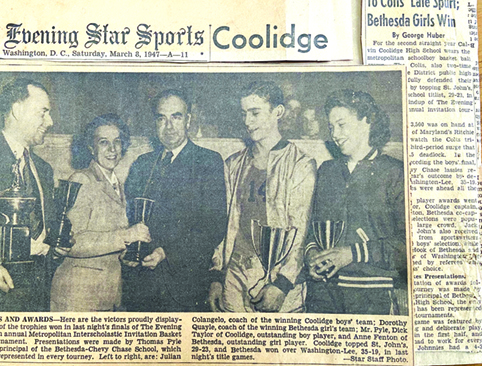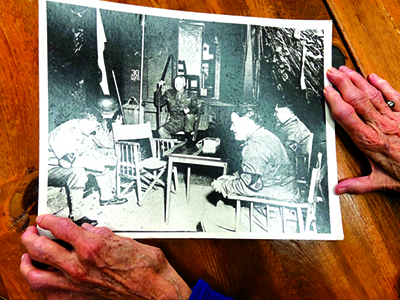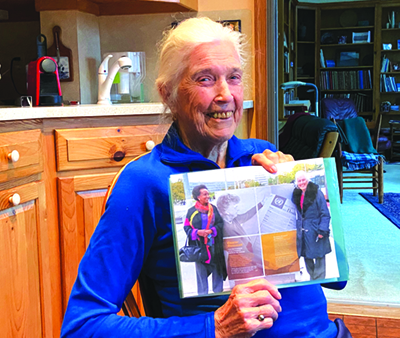By Carol Vaughn
Anne Fenton Herdt, 89, of Accomac is celebrating this month — but it’s not about the holidays.
Dec. 10 marked the 71st anniversary of the adoption of the Universal Declaration of Human Rights by the United Nations General Assembly in Paris — a document she called ‘the Magna Carta of our time.”
Still, the Magna Carta applied only to the barons and royalty, she said — while the declaration is for every human being.
Herdt, who has devoted much of her life to promoting social justice, wants more people to know about the declaration and what it means for human rights around the world.
“Everybody is in the streets, even today, talking about rights…and nobody knows what they are,” she said.

The declaration, created over two years by a group of people from all over the world with different cultural and legal backgrounds, for the first time set a standard for fundamental, universal human rights.
It has been translated into more than 500 languages.
The Commission on Human Rights, which developed the declaration, was chaired by Eleanor Roosevelt, one of Herdt’s heroes.
“She was the one person with global recognition,” she said.
The declaration’s 30 articles enumerate rights including “the right to life, liberty and security of person,” the right to seek asylum, the right to own property and the right to freedom of religion, among others.
“The most interesting is the first one, which tells you what’s coming,” said Herdt, proceeding to quote the first article from memory: “All human beings are born free and equal in dignity and rights. They are endowed with reason and conscience and should act towards one another in a spirit of brotherhood.”
What stands out to Herdt is that the document marked the first time the rights were specifically declared to belong to “all human beings,” including women and children, she said, adding, “…If you are a human being, you have the right to this dignity and freedom.”
Herdt, who grew up near Washington, D.C., lived abroad as an adult for decades, — including in Switzerland, Greece, and Kuwait — before she and her husband Doug, who worked for Hewlett Packard, moved to the Eastern Shore when she was 80.
One of five children of a union organizer and a women’s suffragist, Herdt came by her activism naturally — “both what I lived through and what I learned from my parents,” she said.
“I was very much aware, as a little girl, of my limitations because I was not a boy,” Herdt said, noting the high school girls basketball team she played on did not have uniforms, while the boys did.

The declaration of rights informed her work in Geneva, Switzerland, as a volunteer for the International Council on Social Welfare, a nongovernmental organization involved in discussions about social justice that represents groups in more than 70 countries at the United Nations.
“We would present papers and were lobbyists in a sense; we would try to convince the governments, who had the vote, to vote this way or that,” she said.
She spent a lot of time at the Human Rights Commission, which Herdt said is, “one of the most contentious areas, because you have different countries, different lifestyles, different religions, different economic levels — and so it is very hard to find common ground.”
She also served on a steering committee that planned world forums associated with the United Nations Decade for Women, including in Beijing and Nairobi.
Before heading to the 1995 forum in Beijing, she asked newspaper editor Bill Sterling for a press pass, offering to send dispatches home in return.
“It was great to go to the press conferences,” she said.
Before leaving Switzerland in 2008, she chaired a task force that raised funds for a plaque in Geneva celebrating Eleanor Roosevelt and marking the 60th anniversary of the Universal Declaration of Human Rights.
Since moving to the Eastern Shore, Herdt has taught a course about the declaration several times for the Academy for Lifetime Learning at Eastern Shore Community College.
She would like to see more people know what the declaration says about human rights.
“Nobody really knows these rights. You have civic and political rights — most people know that; you know, cops can’t push you around.
“But then there are social and cultural rights — and those are less well known,” Herdt said, adding, “It’s the only decent way human beings can exist together.”
Read the Universal Declaration of Human Rights in its entirety at https://www.un.org/en/universal-declaration-human-rights/ or here.



